Related Research Articles
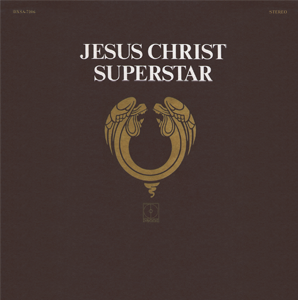
Jesus Christ Superstar is a sung-through rock opera with music by Andrew Lloyd Webber and lyrics by Tim Rice. Loosely based on the Gospels' accounts of the Passion, the work interprets the psychology of Jesus and other characters, with much of the plot centered on Judas, who is dissatisfied with the direction in which Jesus is steering his disciples. Contemporary attitudes, sensibilities and slang pervade the rock opera's lyrics, and ironic allusions to modern life are scattered throughout the depiction of political events. Stage and film productions accordingly contain many intentional anachronisms.
Annas was appointed by the Roman legate Quirinius as the first High Priest of the newly formed Roman province of Judaea in AD 6 – just after the Romans had deposed Archelaus, Ethnarch of Judaea, thereby putting Judaea directly under Roman rule.
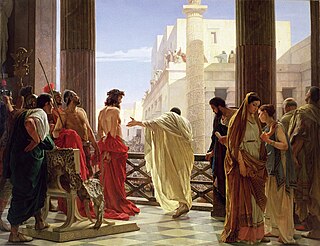
Pontius Pilate was the fifth governor of the Roman province of Judaea, serving under Emperor Tiberius from 26/27 to 36/37 AD. He is best known for being the official who presided over the trial of Jesus and ultimately ordered his crucifixion. Pilate's importance in Christianity is underscored by his prominent place in both the Apostles' and Nicene Creeds. Because the gospels portray Pilate as reluctant to execute Jesus, the Ethiopian Orthodox Tewahedo Church believes that Pilate became a Christian and venerates him as both a martyr and a saint, a belief which is historically shared by the Coptic Church, with a feast day on 19 or 25 June, respectively.
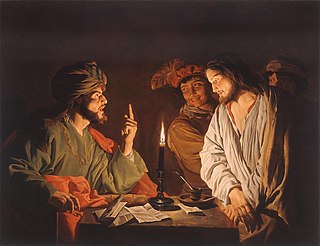
Josef Ben Caiaphas, known simply as Caiaphas in the New Testament, was the Jewish high priest during the years of Jesus' ministry, according to Josephus. The Gospels of Matthew, Luke and John indicate he was an organizer of the plot to kill Jesus. He famously presided over the Sanhedrin trial of Jesus. The primary sources for Caiaphas' life are the New Testament, and the writings of Josephus. The latter records he was made high priest by the Roman procurator Valerius Gratus after Simon ben Camithus had been deposed.

The King of Kings is a 1927 American synchronized sound epic film produced and directed by Cecil B. DeMille. It depicts the last weeks of Jesus before his crucifixion and stars H. B. Warner in the lead role. While the film has no audible dialog, it was released with a synchronized musical score with sound effects using the RCA Photophone sound-on-film process.
The unnamed wife of Pontius Pilate appears only once in the Gospel of Matthew (27:19), where she intercedes with Pilate on Jesus' behalf. It is uncertain whether Pilate was actually married, although it is likely. In later tradition, she becomes known as Procula or Procla and plays a role in various New Testament Apocrypha. At a later date, she acquires the name Claudia Procula in Western tradition, as well as other names and variants of these names. She is venerated as a saint by the Eastern Orthodox Church, the Eastern Catholic Church, the Coptic Church, and the Ethiopian Church. She has also frequently been featured in literature and film.
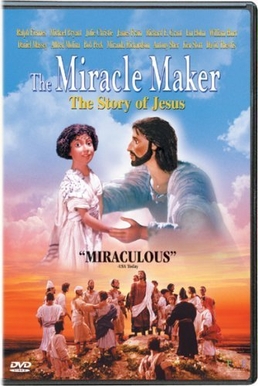
The Miracle Maker sometimes subtitled The Story of Jesus, is a 1999 Welsh-Russian stop motion-animated film directed by Derek Hayes and Stanislav Sokolov.

Jesus is a 1999 Italian-American biblical historical drama television miniseries that retells the historical events of Jesus Christ. It was shot in Morocco and Malta. It stars Jeremy Sisto as the titular character, Jacqueline Bisset as Mary of Nazareth, Debra Messing as Mary Magdalene and Gary Oldman as Pontius Pilate. The miniseries was broadcast in Italy in two parts on December 5 and 6, 1999 before being broadcast in the United States on May 14 and 15, 2000.
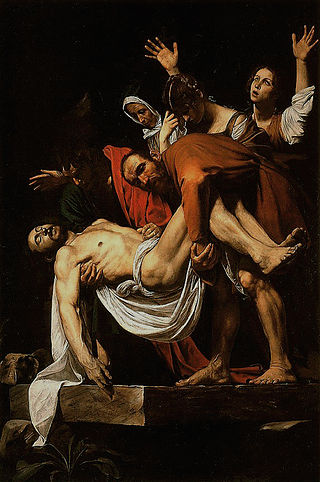
In the New Testament, the Sanhedrin trial of Jesus refers to the trial of Jesus before the Sanhedrin following his arrest in Jerusalem and prior to the trial before Pontius Pilate. It is an incident reported by all three Synoptic Gospels of the New Testament, while the Gospel of John refers to a preliminary inquiry before Annas. The gospel accounts vary on a number of details.

Colin George Blakely was a Northern Irish actor. He had roles in the films A Man for All Seasons (1966), The Private Life of Sherlock Holmes (1970), Murder on the Orient Express (1974), and Equus (1977).

The Passion is a television drama serial produced by the BBC and HBO Films in association with Deep Indigo Productions. It tells the story of the last week in the life of Jesus. The serial was first proposed by Peter Fincham in 2006, on the success of the contemporary-set Manchester Passion. Writer Frank Deasy and producer Nigel Stafford-Clark were inspired to make a drama that opened up the story beyond the "vacuum" it is often told in. They did this by expanding the roles of Pontius Pilate and Caiaphas, and exploring the politics of Judea at the time. Deasy and Stafford-Clark were aided by scholar Mark Goodacre, with whom they put together an extensive research manual about the topic.

The Last Days of Judas Iscariot is a play by American playwright Stephen Adly Guirgis first staged Off-Broadway at The Public Theater on March 2, 2005, directed by Philip Seymour Hoffman.
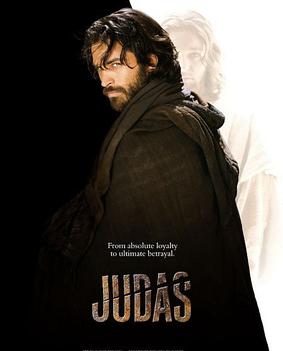
Judas is a 2004 Biblical television drama film depicting the intertwined lives of Judas Iscariot and Jesus of Nazareth. The story depicts Judas as having sympathetic motives, desiring to free the Jewish people from Roman rule. It was shot in Ouarzazate, Morocco.

The Visual Bible: Matthew is a 1993 film portraying the life of Jesus as it is found in the Gospel of Matthew. The complete Gospel is presented word-for-word based on the New International Version of the Bible. It was directed by South African film maker Regardt van den Bergh and stars veteran actor Richard Kiley in the role of St. Matthew, newcomer Bruce Marchiano as Jesus, and Gerrit Schoonhoven as Peter. Marchiano portrays Jesus as a joyous, earthy, personal man with a sense of humour.
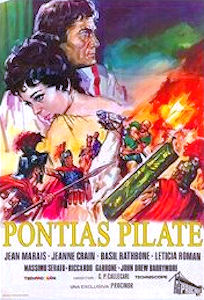
Pontius Pilate is an Italian drama film from 1962, directed by Gian Paolo Callegari and Irving Rapper, written by Oreste Biancoli, starring Jean Marais and Jeanne Crain.

The Day Christ Died is a 1980 American television film directed by James Cellan Jones. The collaborative production by 20th Century Fox and CBS-TV dramatizes the last 24 hours of Jesus Christ's life and is based on Jim Bishop's 1957 book of the same name. The book was co-adapted by James Lee Barrett, who, 15 years prior, had scripted The Greatest Story Ever Told for George Stevens.

The Shadow of Nazareth is a 1913 silent movie set in Jerusalem at the time of the crucifixion of Jesus. Starring Arthur Maude and Constance Crawley, it depicts the story of a vain woman named Judith, her brother Judas Iscariot, and her two admirers: Barabbas, who is a thief, and Caiaphas, the high priest of Jerusalem.

Son of God is a 2014 American epic biblical film directed by Christopher Spencer, and produced by Mark Burnett and Roma Downey. The film retells the life of Jesus Christ and is an adaptation of the ten-hour miniseries The Bible, which aired in March 2013 on the History channel, and immediately following the movie begins another TV series called A.D. The Bible Continues.

The Calvary at Pleyben, dating from 1555, is located in the village of Pleyben in Brittany, northwestern France.

Vindicta Salvatoris is a text of New Testament Apocrypha that expands the story of the aftermath of Jesus's execution. It was often presented as a supplement to the Gospel of Nicodemus. The oldest known copies are two Latin versions of the Vindicta Salvatoris, both dated to the 8th or 9th centuries and likely when the work was authored. The work is thought to have been composed in southern France, perhaps the Aquitaine region.
References
- ↑ "Radio Times looks at 14 years of distinguished contributions to BBCtv Drama". Radio Times. 27 January – 2 February 1979.
- ↑ "BFI Screenonline: Son of Man". Screenonline.org.uk. 1969-04-16. Retrieved 2014-08-24.
- ↑ Lee, Marc (8 March 2008). "Son of Man: Testaments to the power of Christ's story". Daily Telegraph . Retrieved 2014-08-24.
- ↑ Potter, Dennis (1970-01-01). Son of Man A Play. S. French. ISBN 057316004X . Retrieved 2016-06-03.
- ↑ Pelley, Rich; Pelley, Interview by Rich (10 September 2020). "Ciarán Hinds' teenage obsessions: 'Van Morrison took music into a different dimension'". The Guardian . Retrieved April 6, 2021.